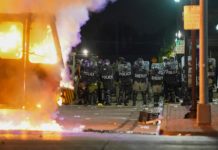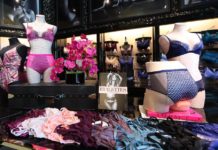Want to get The Morning by email? Here’s the sign-up.
Good morning. China passes its Hong Kong crackdown. Europe and Japan push for new stimulus. And Larry Kramer is remembered as a historic figure. But let’s start with a coronavirus question many people find confusing.
As lockdowns lift, many more Americans are going to come in contact with surfaces that other people have touched: doorknobs, tabletops, shopping bags and more. And I know that many people find these situations confusing.
The early scientific advice seemed to encourage people to treat surface contact with utmost seriousness. More recently, research has suggested that few people get the virus this way. The main transmission mechanism instead appears to be close contact with someone who has the virus, like talking face-to-face or sitting nearby in an indoor setting. Those situations expose people to enough of a “viral load” to become infected.
The Centers for Disease Control and Prevention recently tried to clarify its guidance on the subject: “It may be possible that a person can get Covid-19 by touching a surface or object that has the virus on it and then touching their own mouth, nose, or possibly their eyes, but this isn’t thought to be the main way the virus spreads.”
So how should you think about surface transmission?
It doesn’t seem to be common, but it does seem possible. It is the most likely explanation for an outbreak at a Chinese shopping mall, as my colleague Tara Parker-Pope points out.
One thing to understand is that merely touching virus particles isn’t enough to become infected. You probably have to touch many particles — and then touch your face. Objects that a small number of other people briefly touch, like groceries and shopping bags, seem to present a very small risk. That’s why I have stopped wiping down every object that comes into my house, as I was when the lockdown began.
In the spectrum of risk, you should worry more about face-to-face conversations and extended time in indoor spaces with people who are outside your household. “We don’t need to be paranoid — you can still play catch or press an elevator button — we just need to wash our hands and be mindful,” Tara told me. She has just published a guide to surface transmission, and I recommend it.
In other virus developments:
FOUR MORE BIG STORIES
1. China passes Hong Kong crackdown
China’s legislature passed a sweeping law today to suppress dissent in Hong Kong, which has for years operated as a semiautonomous city. “Early signals from Chinese authorities point to a crackdown once the law takes effect, which is expected by September,” The Times’s Keith Bradsher writes from Beijing.
2. Outrage grows over Minneapolis death
Activists, family members and elected officials demanded charges in the case of George Floyd, the black man who died in Minneapolis after a white police officer pressed his knee against Floyd’s neck. Community activists are also calling for a federal review of the Minneapolis Police Department, which has been the subject of frequent complaints about excessive force.
Last night: A day of protests in the city ended in widespread damage to stores, The Star Tribune reported. Protests also spread to Memphis and Los Angeles.
3. Europe and Japan add stimulus
The European Union and Japan both took steps Wednesday to spend more money propping up their economies. The moves were the latest signs that other nations are pursuing more aggressive — and, so far, effective — stimulus measures than the United States has.
Jonathan Rothwell, the principal economist at Gallup, published updated data on Wednesday that compared changes in unemployment across countries. Those with smaller increases have typically subsidized companies to keep workers on the payroll during the pandemic, Rothwell told me.
The politics: The European proposal “had all the hallmarks of a historic moment for the E.U.,” The Times’s Matina Stevis-Gridneff wrote, pushing it closer to becoming a central government.
The markets: Stocks rose yesterday, and the S&P 500 is now more than 35 percent above its March low.
4. Larry Kramer, AIDS activist, dies
Larry Kramer, a playwright and an outspoken AIDS activist who helped shock the country into dealing with the crisis in the 1980s, died yesterday at age 84. Susan Sontag called him “one of America’s most valuable troublemakers.”
Dr. Anthony Fauci told The New Yorker in 2002 that Kramer had made a profound mark on history: “In American medicine, there are two eras: before Larry and after Larry.”
Here’s what else is happening
BACK STORY: A WALK IN THE WOODS
You may have come across a viral video of a white woman calling the police on a black man, Christian Cooper, who was bird watching in Central Park. The incident set off intense discussions about racism and quickly led to the woman being fired from her job. Sarah Maslin Nir, a Times reporter, joined Cooper for an early-morning bird-watching session and told us about it:
As a reporter for the Times, you end up inhabiting so many lives — I’ve gone bird watching and horseshoe crabbing and done falconry for stories before.
Mr. Cooper has a virtuoso’s ear for bird song, so he was able to identify what we were about to see by chirp — though I joked I had no way to fact check him. We saw a gray catbird, Baltimore oriole, and he was particularly taken with a yellow warbler.
I would say that he has a level of compassion for what the woman is going through. The quote he said was, “I’m not excusing the racism, but I don’t know if her life needed to be torn apart.”
As time has gone on, more and more has been piled on her, so he’s stopping short of pity, but he feels compassion.
PLAY, WATCH, EAT, HEIST
F.A.Q. for ordering in
The risk of transmission through packaging is slim (for the reasons I described above). Your best bet is contactless delivery, with advance electronic payment, which eliminates the risk of physical interaction for you and the delivery person. Just don’t forget to tip — and if you’re fortunate enough to still have your job, consider making it generous. Tips are down almost 80 percent since the pandemic began, one expert told The Times.
What to do with a stolen van Gogh?
Octave Durham, who stole two Vincent van Gogh paintings in 2002, is an expert thief. After the heist of another van Gogh from a Dutch museum in March, The Times asked Durham for insight on his line of work.
“Look at that,” Durham said as he watched security footage of the recent theft. “His gear is not even professional. If you’re a professional, you’re fully in black. He’s got jeans and Nike sneakers on.”
More sports leagues plan their return
More sports leagues are unveiling ambitious — and potentially risky — proposals to return to the field. The National Women’s Soccer League outlined a compressed season of 25 games over 30 days in an Olympic-style tournament in Utah. In college football, where the financial incentive to play is enormous, some schools have voted to open their training facilities.
A correction: The introduction in yesterday’s newsletter incorrectly said four Minneapolis police officers were fired for their involvement in a fatal shooting; they were fired for their involvement in a fatal confrontation involving a chokehold.
Lauren Leatherby, Ian Prasad Philbrick and Sanam Yar contributed to The Morning. You can reach the team at themorning@nytimes.com.
Source : Nytimes














